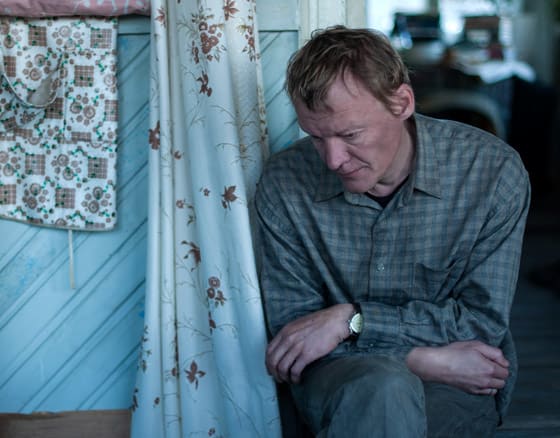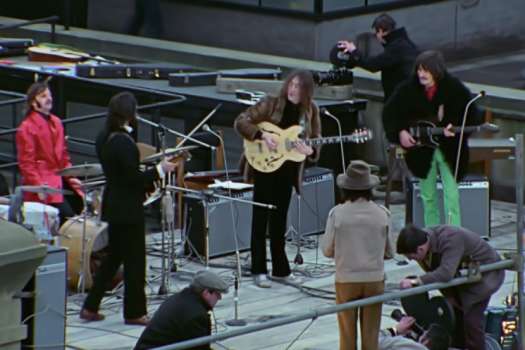Winner of the Best Screenplay prize at last year's Cannes and nominated for Best Foreign Language film at this year's Academy Awards, Andrey Zvyagintsev's Leviathan is perhaps the most cynical critique of institutions and the insidious interplay between political and religious life since the Coens' A Serious Man. Like that film, Leviathan is a spin on the Book of Job, railing against the modern failure of religion and its inability to provide any structure to a life that is careening out of control. While the film has a lot on its mind, it never feels overly determined or preachy, thanks to Zvyagintsev's rich approach to characterization and generous approach to narration, pulling the story back bit by bit until its devastating conclusion.
The film begins as a simple poetic character study before changing shape into a classic story of the little guy versus the institution, before assuming its final shape as something increasingly more cosmic and existential. The story begins with Kolia, a short-tempered man living in a small Russian town with his wife and son from a previous marriage. The family owns a beautiful piece of land, but Vadim the mayor, a rude drunk with a penchant for violence and corruption, wants to buy the land for his own petty reasons. Vadim begins to put the heat on Kolia with increasing threats, and Kolia calls on Dimitri, his childhood friend who now works in Moscow as a lawyer, to help him in the approaching legal battle over his home. Amidst institutional pressures and threats of violence from Vadim (who has his hand in the church's pocket), both Kolia and Dimitri begin to doubt their positions in life and secrets are revealed all around as this small society begins to collapse. Think of it as the Book of Job meets Crime and Punishment meets the Rob Ford story.
Essential to Leviathan's dramaturgy is the way each of these pieces feel part of a whole, where each narrative turn feels both unexpected and inevitable, letting us in on its true intentions while never laying all the cards on the table until the final moments. Zvyagintsev is merciless in his critique, stressing the failure of religion and politics on all levels from the personal to the national, beginning and concluding with scenes in which lawyers read off a slew of legal charges in a monotonous, meaningless pseudo-babble. In his classic formalist approach, Zvyagintsev's argument is brutally effective: language has lost its communicative power of the individual and has been rendered a blunt tool by the powers that be, losing all meaning in its institutional use.
If Leviathan begins as a simple parable-meets-genre exercise, it pushes this approach into the realm of near-abstraction by its conclusion, a series of shots of landscapes that force us to contemplate the ways in which corrupt forces of power have impacted and destroyed the natural, political and spiritual orders of the setting. DP Mikhail Krichman has to be commended here for his rich tableaus (shot in lush 35mm), making full use of his widescreen frame to illustrate the strained relationships the characters maintain with the beautiful but harsh landscapes, ever stressing the impending violence that exists on the edge of this society. Alexei Serebriakov's Kolia feels ripped out of the pages of a forgotten novel, the timeless archetype of the man forcing his will against the unforgiving landscape and unable to reconcile his anger against the institutions that seek to destroy him. Much like Leviathan itself, he's a character rooted in genre but able to transcend that simple characterization by pushing his existence into something more contemplative and existential.
This is an example of classic cinema done right, framing a story everyone knows while feeling utterly modern and not weighed down by its classicism thanks to the way the narrative unfolds without the viewer even realizing it. It's an institutional critique that is absolutely stunning at all levels. Leviathan comes highly recommended.
(Mongrel Media)The film begins as a simple poetic character study before changing shape into a classic story of the little guy versus the institution, before assuming its final shape as something increasingly more cosmic and existential. The story begins with Kolia, a short-tempered man living in a small Russian town with his wife and son from a previous marriage. The family owns a beautiful piece of land, but Vadim the mayor, a rude drunk with a penchant for violence and corruption, wants to buy the land for his own petty reasons. Vadim begins to put the heat on Kolia with increasing threats, and Kolia calls on Dimitri, his childhood friend who now works in Moscow as a lawyer, to help him in the approaching legal battle over his home. Amidst institutional pressures and threats of violence from Vadim (who has his hand in the church's pocket), both Kolia and Dimitri begin to doubt their positions in life and secrets are revealed all around as this small society begins to collapse. Think of it as the Book of Job meets Crime and Punishment meets the Rob Ford story.
Essential to Leviathan's dramaturgy is the way each of these pieces feel part of a whole, where each narrative turn feels both unexpected and inevitable, letting us in on its true intentions while never laying all the cards on the table until the final moments. Zvyagintsev is merciless in his critique, stressing the failure of religion and politics on all levels from the personal to the national, beginning and concluding with scenes in which lawyers read off a slew of legal charges in a monotonous, meaningless pseudo-babble. In his classic formalist approach, Zvyagintsev's argument is brutally effective: language has lost its communicative power of the individual and has been rendered a blunt tool by the powers that be, losing all meaning in its institutional use.
If Leviathan begins as a simple parable-meets-genre exercise, it pushes this approach into the realm of near-abstraction by its conclusion, a series of shots of landscapes that force us to contemplate the ways in which corrupt forces of power have impacted and destroyed the natural, political and spiritual orders of the setting. DP Mikhail Krichman has to be commended here for his rich tableaus (shot in lush 35mm), making full use of his widescreen frame to illustrate the strained relationships the characters maintain with the beautiful but harsh landscapes, ever stressing the impending violence that exists on the edge of this society. Alexei Serebriakov's Kolia feels ripped out of the pages of a forgotten novel, the timeless archetype of the man forcing his will against the unforgiving landscape and unable to reconcile his anger against the institutions that seek to destroy him. Much like Leviathan itself, he's a character rooted in genre but able to transcend that simple characterization by pushing his existence into something more contemplative and existential.
This is an example of classic cinema done right, framing a story everyone knows while feeling utterly modern and not weighed down by its classicism thanks to the way the narrative unfolds without the viewer even realizing it. It's an institutional critique that is absolutely stunning at all levels. Leviathan comes highly recommended.




